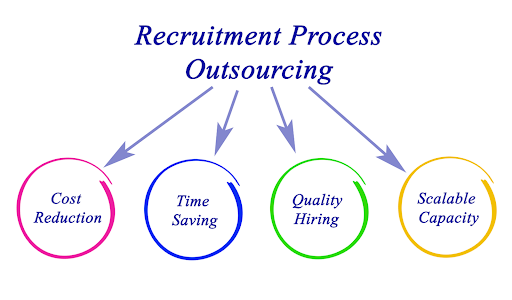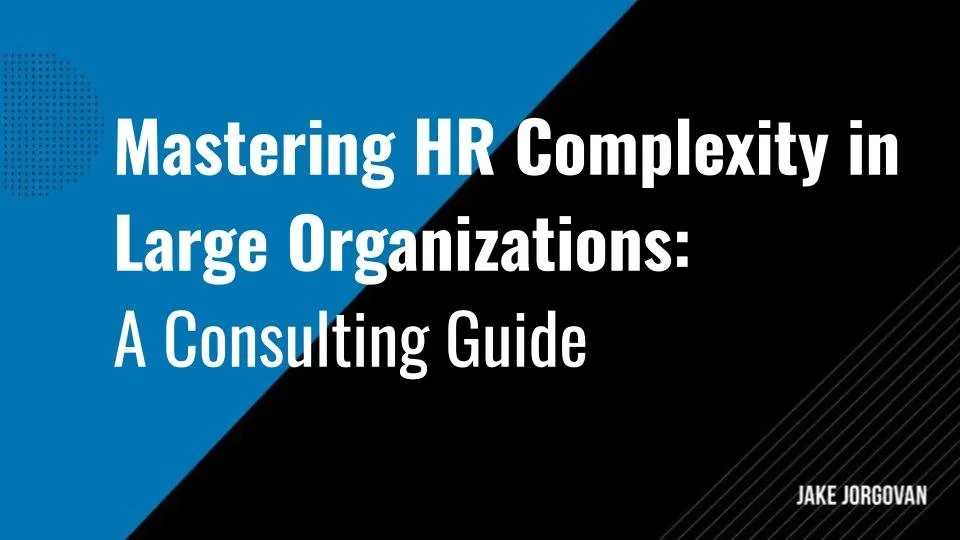Transforming Talent Acquisition: The Strategic Advantage of Recruitment Process Outsourcing (RPO)
Businesses constantly search for innovative strategies to streamline recruitment processes, reduce costs, and attract top-tier candidates.
Fortunately, Recruitment Process Outsourcing (RPO) is a game-changing solution that offers a strategic advantage to those willing to embrace its potential.
This article explores RPO's transformative impact on talent acquisition, providing insights into how it can optimize hiring practices and drive business growth.
We will cover:
The scope of RPO and the types of RPO engagements
5 Key strategic advantages of RPO
Whether you're struggling with recruitment complexities or looking to refine your existing process, this exploration of RPO gives you valuable guidance and actionable solutions.
Continue reading to unlock its strategic benefits.
Understanding Recruitment Process Outsourcing (RPO)
Recruitment Process Outsourcing (RPO) is a specialized service in which an organization transfers all or part of its permanent recruitment processes to an external provider. This approach allows companies to enhance their recruitment capabilities without investing heavily in internal resources or infrastructure.
RPO services are comprehensive, covering many activities beyond mere candidate sourcing. They include but are not limited to job profiling, sourcing, screening, interviewing, background checks, compliance tracking, and reporting on hiring metrics. Leveraging RPO means you can benefit from advanced recruitment technology and methodologies, access to a broader talent pool, and industry-specific expertise.
RPO engagements are categorized into three primary types: on-demand, function-based, and end-to-end solutions.
On-Demand RPO caters to immediate, short-term needs without a long-term commitment. It is typically used to manage unexpected increases in hiring volumes or to fill specialized roles that do not justify a full-time recruiting effort.
Function-based RPO focuses on a specific part of the recruitment process, such as sourcing or interview scheduling. This model suits you if you want to enhance particular aspects of your recruitment process without outsourcing it entirely.
End-to-end RPO encompasses the complete takeover of a company’s recruitment function. It is the most comprehensive form of RPO, giving you a fully outsourced solution that covers every aspect of the recruitment lifecycle, from job requisition to onboarding.
As you can see, each type of RPO engagement offers different flexibility, scalability, and control levels, allowing you to tailor the service to your specific needs. The choice among these models depends on your organization’s recruitment challenges, hiring volume, and strategic goals.
5 Strategic Advantages of Recruitment Process Outsourcing
The best RPO providers work closely with their clients to develop customized solutions that align with your company’s culture, values, and business objectives, ensuring a seamless integration with existing HR functions. But you can reap plenty of other advantages that we’ll review in a second.
1) Cost Reduction in the Recruitment Process
Cost reduction in recruitment is a critical strategic advantage, especially when financial efficiency directly correlates with a competitive edge.
An RPO can help you with:
Lowered Fixed Costs: Outsourcing converts fixed recruitment costs into variable costs that scale with your hiring needs. This flexibility allows you to allocate resources more efficiently, avoiding the financial strain of maintaining an in-house recruitment team, especially during low hiring periods.
Reduced Recruitment Cycle Expenses: External agencies optimize recruitment workflows, leveraging their expertise and resources to shorten the hiring cycle. A faster process reduces the costs associated with extended vacancies, such as lost productivity and the need for temporary staffing solutions.
Economies of Scale: Recruitment Process Outsourcing (RPO) providers benefit from economies of scale by managing recruitment for multiple clients. That’s why they can offer services at a lower cost per hire than an in-house team that doesn't have the same bandwidth or access to bulk purchasing of recruitment tools and advertising.
Access to Advanced Recruitment Technologies: RPO providers invest in the latest recruitment technologies, including AI-driven applicant tracking systems, at no extra cost to their clients. These technologies streamline the recruitment process, making it more efficient and cost-effective than traditional methods.
Minimized Training and Development Costs: RPO firms are recruitment specialists and equipped with trained and experienced staff. As a result, you save on the substantial costs of training and developing an in-house team with the same level of expertise.
Optimized Resource Allocation: Outsourcing allows you to focus your internal resources on core activities rather than recruitment. This resource allocation optimization contributes to overall cost reduction because it enables a more strategic deployment of capital and human resources.
Insider Tip:
A strategic approach to leveraging RPO involves starting with a pilot program for a segment of your hiring needs. This allows you to gauge the effectiveness and efficiency gains before committing fully. Basically, you ensure a tailored solution that maximizes cost savings while meeting your specific recruitment challenges.
2) Access to a Wider Pool of Talent and Specialized Recruitment Expertise
Harnessing a global talent pool and specialized recruitment expertise through outsourcing offers a strategic edge, propelling companies beyond conventional hiring constraints. This approach not only diversifies the talent landscape but also injects a high level of proficiency into the recruitment process.
Here are the reasons why you need that:
Specialization in Niche Recruitment: RPO providers specialize in sourcing talent across various industries and roles, including niche positions that are typically hard to fill. Their expertise and dedicated resources in these areas mean they can more effectively attract and engage with specialized candidates.
Global Talent Access: Outsourcing recruitment breaks down geographical barriers, providing access to a global talent pool. This is particularly great for roles where local talent may be scarce or if you want to diversify your workforce.
Advanced Sourcing Techniques: RPO providers use advanced sourcing strategies and have access to extensive databases and networks that most organizations cannot match internally. This means they can uncover passive candidates who are not actively seeking new opportunities but are open to the right offer.
Market Intelligence: RPO firms possess deep market insights, including salary benchmarks, candidate expectations, and hiring trends. This intelligence is vital for crafting compelling offers that attract top talent and advising clients on realistic expectations.
Branding Expertise: They also excel in employer branding, ensuring that your company’s value proposition is effectively communicated to attract the right candidates. This expertise helps position your company as an employer of choice in competitive talent markets.
Process Efficiency: Focusing solely on recruitment, RPO providers streamline the hiring process, implementing best practices and innovative technologies that reduce the hiring time and improve the candidate experience.
Insider Tip:
A key tip for leveraging RPO's access to talent and expertise is to actively collaborate with your provider to define your employer brand and unique value proposition. This partnership ensures that the recruitment messaging aligns with your company’s culture and goals, attracting qualified candidates who are a cultural fit.
3) Scalability of Recruitment Efforts in Response to Business Needs
The ability to scale recruitment efforts is indispensable in today's business environment, where the demand for talent can fluctuate dramatically. This scalability ensures you can adapt quickly to market changes, growth spurts, and project-driven hiring needs without compromising talent quality or operational efficiency.
Here's why scalability stands out as a strategic advantage and how RPO can contribute:
Adaptability to Business Cycles: RPO enables you to upscale or downscale their recruitment activities in response to their business cycles, so you won’t be burdened with a static recruitment cost structure during lean periods.
Project-based Hiring Efficiency: If you experience fluctuating hiring needs based on projects, RPO provides the agility to quickly ramp up your recruitment efforts to fill roles critical to project success. As a result, all your timelines and project deliverables are met.
Access to a Flexible Talent Pipeline: RPO providers maintain a ready pipeline of vetted candidates, allowing for rapid deployment of talent as needs arise. This capability helps you meet sudden increases in demand without the lead times typically associated with starting a recruitment process from scratch.
Risk Mitigation in Growth Phases: During periods of rapid growth, companies face the challenge of scaling their workforce quickly without diluting quality. RPO offers a strategic solution by providing the expertise and resources to manage large-scale recruitment drives, keeping the quality of hires high.
Strategic Resource Allocation: By leveraging RPO for scalability, you can allocate your internal HR and recruitment resources more strategically, focusing on retention, employee development, and other core HR functions.
Insider Tip:
We recommend establishing clear communication channels and scalability clauses with your RPO provider from the outset. This ensures both parties have a mutual understanding of expectations and can quickly adjust strategies and resources in response to changing recruitment needs.
4) Enhanced Compliance and Risk Management in Hiring Processes
Enhanced compliance and risk management in the recruitment process is a strategic advantage that safeguards you against the complexities and legal pitfalls associated with hiring. It ensures that recruitment practices are efficient, legally sound, and ethically responsible, reflecting positively on your organization's brand and operational integrity.
Here are other RPO advantages you can leverage:
Alignment with Global Standards: RPO providers ensure recruitment practices comply with local and international hiring laws and standards. This will make your life easier if you are operating in multiple jurisdictions or looking to expand globally.
Mitigation of Legal Risks: They know all the latest changes in employment law, significantly reducing the risk of legal challenges related to discriminatory hiring practices, wage compliance, and wrongful termination claims.
Data Protection and Privacy: With stringent data protection regulations like GDPR in effect, RPO providers implement robust processes to manage candidate data securely, safeguarding against breaches and ensuring privacy compliance.
Standardization of Recruitment Processes: RPO leads to standardizing recruitment practices across the organization, minimizing inconsistencies and biases that could lead to compliance issues or disputes.
Ethical Hiring Practices: They ensure the recruitment process is conducted ethically, promoting diversity and preventing any form of discrimination. Thus, they uphold your organization’s reputation and social responsibility.
Audit and Reporting Capabilities: RPO firms offer comprehensive audit trails and reporting capabilities for recruitment activities, ensuring transparency and accountability that can be critical during compliance reviews or audits.
Insider Tip:
Be sure to work closely with your RPO provider to establish a detailed compliance framework at the beginning of your partnership. This framework should include specific compliance goals, reporting metrics, and regular review points to ensure that recruitment practices remain current with the latest legal requirements and industry best practices, thereby enhancing compliance and minimizing risk throughout the recruitment process.
5) Improved Hiring Speed and Quality of Candidates
Improving candidates' hiring speed and quality through recruitment process outsourcing (RPO) addresses two of the most critical challenges in talent acquisition today. Basically, you can fill vacancies more quickly and secure the best talent, driving competitive advantage and organizational success.
Here are more precise ways in which RPOs can help:
Streamlined Recruitment Process: RPO providers use optimized workflows and technologies to streamline recruitment, from sourcing to onboarding. This efficiency significantly reduces the hiring time, allowing you to fill positions faster than traditional methods.
Quality Talent Pool: RPOs invest continuously in building extensive talent pools and networks, ensuring access to high-quality candidates. As we mentioned before, this includes passive candidates who are not actively looking but are open to the right opportunities.
Advanced Screening Technologies: Leveraging the latest in recruitment technology, such as AI-powered screening tools, RPO providers can quickly identify qualified and culturally-fit candidates, thus enhancing the quality of hire.
Market Insight and Positioning: With deep insights into job markets and trends, RPO providers can position the roles more attractively, attracting better candidates faster than competitors.
Dedicated Recruitment Focus: Unlike in-house HR departments that may juggle various responsibilities, RPO firms are solely focused on recruitment, meaning they can dedicate more resources and attention to sourcing and engaging top talent.
Continuous Improvement: RPO providers incorporate feedback loops into their processes, ensuring continuous improvement in both the speed and quality of hires.
Insider Tip:
Leveraging RPO for enhanced hiring speed and quality begins with clearly communicating your organization's needs, culture, and expectations. Our advice is to partner with a firm with a deep commitment to understanding your business. This alignment allows RPO providers to match qualified candidates who will thrive within your organizational ecosystem more effectively. Ultimately, this gives you a strategic advantage in talent acquisition.
Leverage RPO to Optimize Your Talent Acquisition Efforts
This article explored how Recruitment Process Outsourcing (RPO) is revolutionizing how companies hire by making the process more efficient and aligned with your strategic goals. Leveraging RPO allows you to offload the complex and time-consuming tasks of talent acquisition so you can focus on their core operations.
RPO offers other significant benefits, such as cost reduction, improved candidate quality, and scalability in recruitment efforts. These advantages enable you to adapt quickly to market changes and talent demands, ensuring you always have the right people on board.
That said, consider the insights shared here and how they can help you streamline your recruitment process to secure the best talent. Then, pick a partner with whom you can actually reap these benefits.

























